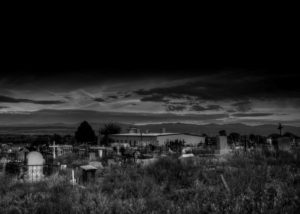A TimeFull God of Providence
Most Christian theologies assume God is essentially timeless. By ‘essentially timeless,’ I mean they assume God does not experience in relationship with others moment by moment. Many assume God ‘sees’ history – beginning to end – from an eternal now, without engaging in giving and receiving relations with creation.
Scholars offer various theories for how the timeless God acts. But each theory shares the view God is fundamentally nontemporal. The timeless God is ‘outside,’ ‘beyond,’ or ‘above’ time.
Open and relational theologies believe God experiences time sequentially — moment by moment — in relation with others. God’s experience is in process, we might say. God experienced the actual past, experiences in the present, and faces an open, yet-to-be-experienced future. God’s experience is timefull not timeless.
Some open and relational theologies say God always experiences in Trinity, as divine members give and receive love. Others say God always relates timefully with creation, never having existed without creaturely others. Some think God relates in Trinity and with creation.

Providence
The idea God everlastingly experiences time makes a difference for a Christian doctrine of providence. The implications of thinking God experiences moment by moment are vast. Exploring them all is not possible in this essay.
I will, however, point to four general characteristics of God-in-process views. I’ll explain what these characteristics typically mean for accounts of providence. I’ll address other characteristics in a future essay.
Open and relational theologies make better sense of the biblical witness, personal experiences, and the world science explores. They also make better sense of the idea love is God’s providential mode of operation.
Open and relational theologies vary. No set of ideas is embraced by every theologian who accepts the label. But family resemblances can be identified. These resemblances shape this view of providence that says God is timefull not timeless.
An Omniscient God Experiences
Open and relational views of providence take the reality of time seriously. Not only is existence fundamentally in process, but God also experiences the process of time. The living and loving Creator everlastingly relates with others moment by moment.
God-in-process views say God faces an undetermined future. That’s the meaning of ‘open’ in open and relational theologies. An undetermined future implies God cannot with certainty know now all that will occur. Exhaustive divine foreknowledge would only be possible if the future were settled, fixed, and complete.
Lack of foreknowledge, however, doesn’t mean God’s knowledge is limited. The future does not yet exist to be known. It does not provide information anyone could know. The future is inherently unknowable because not yet actual. So God should not be thought limited because not knowing what is inherently unknowable.
Open and relational theologians believe God is omniscient, however. God knows all that’s knowable. God knows the completed past, the unfolding present, and possibilities for the future.
This view of God’s omniscience makes better sense of how most Christians relate to God. Petitionary prayer makes better sense, for instance, if the future is open and not yet decided. Why ask God to do something if the future is already settled? To put it another way, petitionary prayer makes little sense if God is timelessly unresponsive.

God in One Sense Affected and Changing; in Another Sense Unaffected and Unchanging
Many of the most influential Christian theologies say God is unaffected by creation. God is ‘impassible,’ to use the ancient language. God is unmoved.
By contrast, open and relational theologies say creatures affect God, because God is passible. Many today use the word “relational” to talk about how others influence God. This view fits biblical accounts that portray God responding to creation and feeling emotions (e.g., anger, sadness, joy) in light of what creatures do.
God undergoes changes in experience. Divine experience is mutable, dynamic, or interactive. God may even change plans – repent – in light of what creatures do. In fact, more than forty biblical passages say God does just that: repents. The idea that God interacts with creation also fits well with the covenants reported in Christian scripture.
Most open and relational thinkers make a distinction between God’s changing experience and unchanging nature. Some call this distinction divine “dipolarity.” I call it God’s “essence/experience binate.” The shared point is that God’s essence is impassible and immutable as eternally constant. But God’s experience is passible and mutable. The phrase ‘God in process’ refers to ongoing divine experiences not the unchanging divine essence.
We best understand biblical statements about an unchanging God (e.g., ‘I am the Lord who does not change’) in light of the immutable divine essence. But we understand passages describing God repenting, responding, expressing emotion, feeling compassion, or making covenants in light of God’s mutable experience.
Genuine but Limited Freedom
Some theologies deny that creatures have genuine (libertarian) freedom. Theologies that adopt divine determinism explicitly reject creaturely freedom. They assume a sovereign God controls all things. Other theologies say humans are free, and yet somehow God simultaneously controls them. This called “compatiblism.” Open and relational theologies say both determinism and compatibilism make no sense.
Open and relational theologies affirm that humans express genuine but limited freedom. Various biological, environmental, historical, epistemological, and other factors limit creatures. But humans freely choose in each moment among limited options arising from and suitable to their circumstances. We are not entirely controlled by God, atoms, genes, neurons, or any environmental factors. But we are influenced by them.
Some open and relational theologies assume other creatures express genuine but limited freedom. Still others speculate that less complex creatures have agency, self-organisation, or spontaneity. Some embrace panpsychism, which affirms responsiveness in even the least complex entities of existence. But open and relational theologies differ among themselves about how far down the complexity scale creaturely agency goes.
Open and relational theologies assume God is not free to do some things. In addition to being unable to do the illogical, the divine nature prevents God from acting in other ways. God is not free to stop existing, for instance, because by nature God exists necessarily (a se). God is not free to stop loving, cannot sin, etc., because God cannot contradict Godself.
Some open and relational theologies argue God’s freedom in relation to creation became constrained once God created the universe ex nihilo. Others say God’s freedom has always been constrained, because God has always been creating and relating to uncontrollable creatures. In either case, God has genuine but limited freedom. Whatever one means by ‘divine sovereignty,’ therefore, divine power must be understood in light of God’s nature, metaphysical laws, and/or what is logical.

God is not Culpable for Evil
Open and relational theologies think about God’s power differently than timeless God theologies. Because God does not predetermine or foreknow, for instance, God neither pre-causes nor foresees evil.
Process theology is best known for arguing God’s power is inherently limited. Some process theologians say these limitations come from the God-world relationship; others say from God’s relation to creativity; others say metaphysical laws constrain God. The strength of such claims is hard to overemphasize: the God process theology describes cannot coerce and is therefore not culpable for failing to prevent genuine evil. God cannot cause evil nor singlehandedly prevent it!
Other open and relational theologies say God voluntarily self-limits. This means God ‘allows’ or ‘permits’ evil. Some believe God made a promise at creation never to intervene. Others say once creation exists, God’s power becomes limited.
Such claims partly answer questions of evil. They reject the idea evil is pre-decided or foreknown. But divine self-limitation theologies are not as strong as process theology when it comes to solving the problem of evil. Survivors wonder why the voluntarily self-limited God doesn’t occasionally un-self-limit, in the name of love, to prevent their suffering.
God-in-process views vary in their views about demons and a devil. Some reject the idea such ontological beings exist but acknowledge demonic nonagential principalities and powers. Others embrace demons and a devil as ontological beings. These theologies blame at least some disorder, tragedy, and evil to the activity of destructive agents.
Conclusion
In this essay, I’ve laid out four ways theologies of providence that assume God is timefull differ from theologies assuming God is timeless. Much more could be said, of course, and I’ll write a second essay laying out other ways.
It matters to think God experiences time rather than standing outside it.
The idea God that everlastingly experiences time makes a difference for the Christian doctrine of providence. I explain the difference in this essay… Share on X
Comments
Tom, I happened to hear you on the Bible for normal people podcast. and I just wanted to say that I very much appreciate your story, your thoughtfulness, and most of all your heart. I find all that very helpful to me and my current place in the journey. Many, many thanks and best wishes in the unforeseeable future.
Thanks for your encouraging note, Ross!